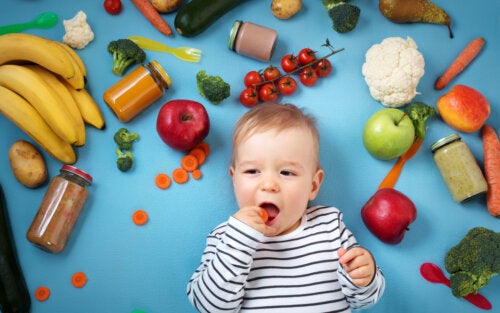The Importance of Nutrition in Infant Cognitive Development
Nutrition is a key factor in infant cognitive development. In the following article, we'll tell you everything you need to know.

The brain is an active organ that makes, creates, and even erases connections between its nerve cells (neurons). This requires a lot of energy and various nutrients to stimulate and enhance brain actions, which begin from the beginning of life in the womb. Hence, the importance of nutrition in infant cognitive development.
The components of the diet can influence the cognitive capacity of the human being. For example, certain types of fats, vitamins, minerals, and antioxidants allow the formation of certain substances related to learning, reasoning, and memory. Keep reading to find out what the main nutrients that allow optimal cognitive development in our babies are, as well as what foods contain them.
What is cognitive development?
Cognitive function consists of all those processes that are related to thinking. These include memory, reasoning, problem-solving, language development, and decision-making.
The Spanish Nutrition Foundation (FEN) emphasizes that good nutrition during the first years of life is key to learning and processing capacity later in life. For example, good infant cognitive development has a direct impact on school performance and success in adulthood. The FEN also explains that there are 3 fundamental stages that determine it:
- In the womb and the infant stage, which is critical in the 20th week of gestation and reaches a maximum from the 32nd to the 40th week.
- During the first two years of life.
- In preschool and school-age children.
Nutrients magazine explains the close relationship between nutrition and the cognitive development of babies. When there are alterations in the diet since pregnancy, memory, reasoning, and attention are affected. Cognitive deterioration can manifest itself as depression, dementia, or Alzheimer’s disease, among others. Below, we’ll explain how different nutrients intervene in infant cognitive development.

Essential nutrients for infant cognitive development
There are some nutrients that are specific for brain development and its functions. What are they and how does each of them act in infant cognitive development? We’ll explain below.
Proteins
The brain produces substances called neurotransmitters that are involved in cognitive function. These include serotonin, dopamine, and adrenaline, which are formed from the amino acids tryptophan and tyrosine, which are present in food proteins.
Low levels of serotonin are associated with decreased learning, reasoning, and memory. Roberts’ team explains that there’s a positive relationship between the intake of serotonin precursor amino acids and cognitive ability.
Tryptophan is found in abundance in animal protein, such as red meat, poultry, fish and fish by-products, eggs, milk, and cheese. It’s also found in nuts, seeds, soy, cocoa, peanuts, and other legumes.
Carbohydrates
The brain needs to obtain glucose or sugar quickly and continuously, as this is its main source of energy. It’s important to note that the area of learning and memory is vulnerable to a failure in the supply of this nutrient.
Foods with a low glycemic index (GI), i.e., whose sugar is absorbed slowly and progressively, decrease insulin resistance. Therefore, they can improve attention, memory, and mathematical ability, among other processes. On the other hand, eating a lot of simple sugars makes attention and concentration difficult.
Low GI foods include cereals and whole-grain derivatives, oats, legumes, and fruits such as apples, pears, tomatoes, kiwis, and peaches. Also, broccoli, cauliflower, zucchini, corn, yam, quinoa, barley, dairy products, and almond and soy milk.
Omega-3 fat
Saturated fatty acids in the diet are associated with cognitive impairment. However, there’s a polyunsaturated, omega-3 fatty acid that’s a component of brain membranes and helps form neurotransmitters. It’s known as docosahexaenoic acid or DHA.
DHA plays an important role in memory and learning. The journal Lancet published a study in which it was shown that supplementation with DHA during pregnancy, lactation, and the first years of life improved the mental performance of children. Among the foods that contain it, we find oily fish (sardines, salmon, bonito, mackerel, pomfret, and horse mackerel, among others), shellfish, and fortified foods.
Minerals
Iron is involved in the synthesis of myelin, which coats the axon of neurons and allows communication between them. In addition, iron deficiency anemia has been found to be related to decreased memory and concentration and poor performance. On the other hand, supplements of this mineral improve cognitive capacity.
On the other hand, iodine is necessary for proper brain and mental development. For example, some studies have found a link between iodine deficiency during pregnancy and poor verbal and reading intelligence in childhood.

Vitamins
B-complex vitamins, such as B1, B6, B12, and B9, are essential for proper brain function, and many of them from the perinatal period. Folic acid or B9 deficiency is associated with neural tube defects. Vitamins B6 and B12 are used in the production of neurotransmitters.
Vitamin D deficiency has also been linked to alterations in cognitive function and impairment. Choline forms the neurotransmitter acetylcholine and cell membrane phospholipids. According to a study, an adequate intake of choline in mothers during pregnancy is related to an improvement in the memory of their children during infancy.
These vitamins are found in plant-based foods, such as seeds, legumes, and cereals. B12 is provided by red meat, fish, chicken, eggs, and milk. Therefore, the latter should be supplemented in vegan diets.
Antioxidants
Natural antioxidants, such as vitamins C, E, beta-carotene, zinc, and selenium, prevent cognitive deterioration caused by oxidative stress. They’re considered to be protective of neurons. In addition, vitamin C helps in the production of neurotransmitters, as does zinc. The latter is associated with memory and learning problems.
Fresh yellow and orange vegetables and fruits are considered the best sources of beta-carotene. Vitamin C is found in strawberries, guava, peppers, kiwi, citrus fruits, parsley, and broccoli. Vitamin E or tocopherol, on the other hand, predominates in oilseeds. In addition, zinc and selenium are present in cereals, legumes, and seeds.
Probiotics and prebiotics
Probiotics are beneficial bacteria with which some foods are prepared and grow exponentially in the intestine when certain nutrients called prebiotics are consumed. Probiotics can protect the brain throughout its development and allow the modulation of the intestinal microbiota.
Nutrition is key to infant cognitive development
Nutrition is an extremely important factor in the cognitive development of babies. Therefore, there are several nutrients that allow good brain development and the synthesis of chemical substances associated with learning, memory, attention, and comprehension.
Maintaining a complete, quality, balanced, and healthy diet that emphasizes certain specific nutrients is key. In this regard, the intake of antioxidants, vitamins C, E, D, B complex, zinc, iron, iodine, tryptophan, and omega-3 will ensure that our babies have excellent cognitive development.

